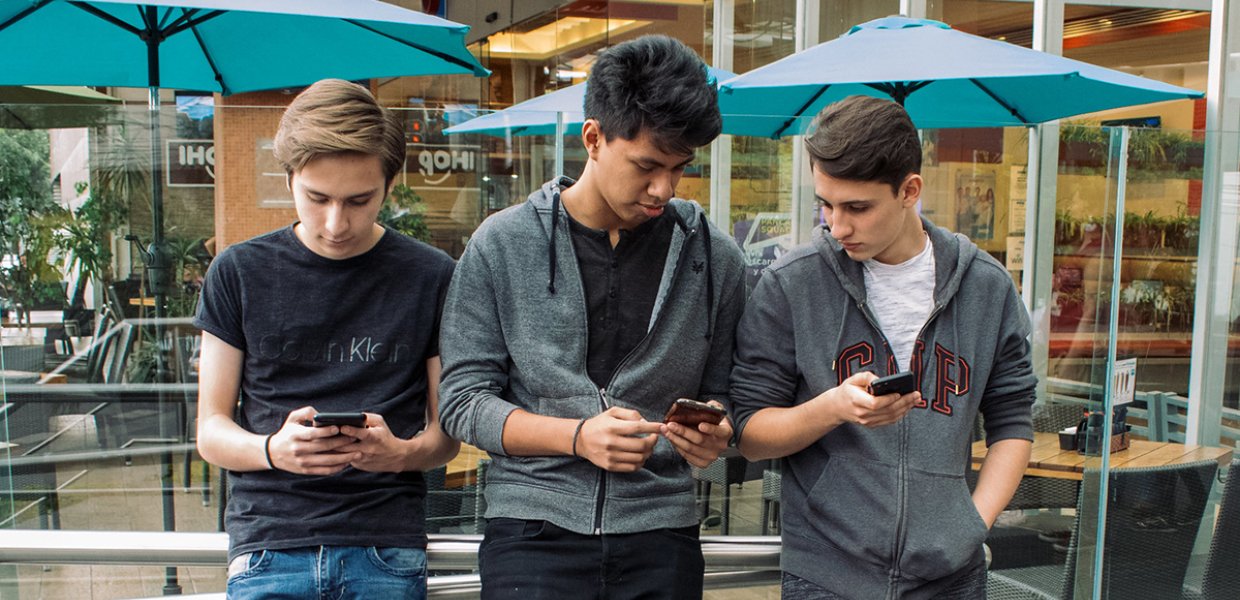For Pedro Resendez, navigating cell phone use in his early teen years was a challenge, particularly because of the tension it caused with his parents. But, over time, the family dynamic changed.
“I think my parents started trusting me more,” he said. “They started knowing that I use the phone as a positive tool rather than a negative tool.”
Resendez spoke before a packed audience at the Centro de Cultura Digital in Mexico City on Oct. 1, as part of a seven-member panel of Mexico City high-schoolers discussing The New Normal: Parents, Teens, and Mobile Devices in Mexico, a new study from USC Annenberg and the media and family nonprofit Common Sense.
The first-of-its-kind study in Mexico surveys parents and teens to better understand the ways Mexican families engage with their digital devices. Following previous studies in the United States, Japan, and the United Kingdom, Mexico is the fourth country included in the global mapping project designed to advance a cross-cultural exploration of family digital media engagement.
At the event — conducted in both English and Spanish — USC Annenberg Dean Willow Bay and Common Sense CEO James P. Steyer shared and discussed the results of their latest study with the panelists, as well as an audience of nearly 100 Mexican media, government officials, academics — and of course, parents and teens.
Bay began by providing an overview of the study’s key findings. Close to half of teens (45 percent) surveyed in Mexico say they feel they spend too much time on their mobile devices, half say they “feel addicted,” and 77 percent of teens say they feel distracted daily by their mobile phones. Four out of five Mexican parents agree that their teens are distracted by these devices daily, and almost two-thirds feel they spend too much time on them and believe they are “addicted.”
Steyer noted that, while there were many similarities between the Mexico survey results and the three other countries studied, some differences stood out.
“To me, the single biggest thing that comes across in Mexico that is different from the other countries is the emphasis on family in a unique way,” he said.
The study found that Mexican parents and teens are doing more to ensure healthy use of mobile devices, with 33 percent of parents and 29 percent of teens saying they “very often” try to reduce their time on the devices, compared with just 12 percent of parents and 7 percent of teens in the U.S. In addition, Mexican families are more likely to have family rules on the use of mobile devices than those in other countries studied.
Bay added that more than 70% of Mexican parents do things like take away mobile devices as a punishment for bad behavior or impose some kind of restrictions on their use — including following their teens on social media. “My children in particular don’t love it when I do that, but I do it anyway,” Bay said.
Maria Del Río, another panelist and a high school junior, affirmed the same challenge in her family’s daily life.
“There’s definitely been a few times where my parents are like, ‘We’re at the dinner table, put your phone down,’" she said. “I recognize that maybe I have been spending too much attention on my phone, but it comes more in terms with, we're creating this dialogue. It's like, ‘Hey, pay more attention to what’s happening in the physical world instead of the virtual one,’ which is completely understandable if, again, it’s coming from a person that we understand as an ally, as someone that’s helping us and as someone that’s fostering us and helping us grow up.”
Bay pointed out that, even with all of these concerns about mobile device use, the vast majority of parents and teens said that the use of devices makes no difference in their relationship to each other. Most Mexican parents and teens — 70% or more — said they believe mobile devices help teens acquire important tech skills, which benefit them at school, prepare more effectively for the workplace, and allow them to be well-informed about current events.
“Even with all of the problems and the downsides that the 24/7 digital reality brings to our lives, most families think that it’s actually a positive aspect in their life,” Steyer added. “They can communicate better with their kids, they can be in touch more with their kids, they can learn new skills and jobs for the 21st century.”
Panelist and high school senior Emilia Hojel said she shares this optimistic view on technology.
“I see mobile devices more as a tool, in terms of with my relationship with my family and my parents, to stay connected with my parents and for safety,” she said. “It gives me more freedom.”
Hojel believes that balancing mobile device use with the need to engage offline is key.
“A small step you can take is just being aware of how much time you spend on [your phone],” she said. “You can embrace all those [positive] aspects, but at the same time stay away from the negative ones, and just kind of setting the priority that you want to be around your family, and with your friends, and outside — and maybe with your dogs!”
